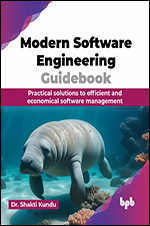Software Estimation Best Practices, Tools & Techniques: A Complete Guide for Software Project Estimators
- 4h 24m
- Murali K. Chemuturi
- J. Ross Publishing
- 2009
Almost every software project begins with the utterances, “What will this cost?” and “When will this project be done?” Once those words are spoken, project stakeholders begin to wrestle with how to produce an estimate. Accurately estimating the cost or time to complete a software project is a serious problem for many software engineers, developers and project managers who struggle with costs running double original estimates, putting their careers at risk. It is reported that nearly 50% of all software projects are shelved and that one of the major causes is poor estimation practices. If developing software for internal use, poor estimates can represent a significant drain on corporate profits.
Worldwide growth in the number of companies specializing in the development of software for use by other companies is staggering. India alone has nearly 20,000 such companies. Intense competition has led to an increased demand for fixed-bid pricing in client/vendor relationships, and has made effective cost estimation even more important and, in many cases, critical to a firm’s survival. There are many methods of estimation. Each method has its strengths and weaknesses, proponents and opponents. Knowing how and which one to use on a given project is key to developing acceptable estimates for either internal or external projects.
Software Estimation Best Practices, Tools, & Techniques covers all facets of software estimation. It provides a detailed explanation of the various methods for estimating software size, development effort, cost, and schedule, including a comprehensive explanation of test effort estimation. Emphasizing that software estimation should be based on well-defined processes, it presents software estimation best practices and shows how to avoid common pitfalls. This guide offers direction on which methods are most appropriate for each of the different project types commonly executed in the software development space and criteria for selecting software estimation tools.
This comprehensive desk reference explains software estimation from scratch to help the beginner and features advanced techniques for more experienced estimators. It details project scheduling, including resource leveling and the concept of productivity, as applicable to software estimators, demonstrating the many benefits of moving from the current macro-productivity approach to a micro-productivity approach in software estimation. Software Estimation Best Practices, Tools, & Techniques: A Complete Guide for Software Project Estimators caters to the needs of all software project stakeholders, from novice to expert. It provides the valuable guidance needed to estimate the cost and time required to complete software projects within a reasonable margin of error for effective software development.
Key Features:
- Presents a brief, yet detailed explanation of each the various methods for estimating software size, development effort, cost, and schedule, with guidance on which methods are most appropriate for each of the different project types
- Furnishes criteria for selecting software estimation tools, and shows how to take advantage of best practices and avoid common software estimation pitfalls
- Demonstrates a practical methodology with templates for using Delphi estimation and analogy-based estimation for software projects
- Introduces a new method referred to as software size units (SSU) for measuring software size that does not make use of the untenable concept of “complexity” for adjusting software size
- Provides useful methods for converting software size to effort, deriving true productivity, and analyzing variances between actual and estimated values as a tool for productivity improvement
About the Author
Murali Chemuturi is an information technology and software development subject matter expert, hands-on programmer, author, consultant and trainer. He has more than 23 years of information technology and software development experience and several years of academic experience teaching a variety of computer & IT courses. In 2001, he formed his own IT consulting, training and software development firm known as Chemuturi Consultants. Mr. Chemuturi’s undergraduate degrees and diplomas are in Electrical and Industrial Engineering and he holds an MBA and a Post Graduate Diploma in Computer Methods & Programming. He is a published author in professional journals, a member of IEEE, a senior member of the Computer Society of India and a Fellow at the Indian Institute of Industrial Engineering.
In this Book
-
Software Estimation
-
Paradoxes of Software Estimation
-
Software Estimation from Scratch
-
Software Estimation by Project Type
-
Approaches to Software Estimation
-
Software Size Estimation
-
Software Size Units
-
Software Estimation—Complexity or Density?
-
Software Development Effort Estimation
-
Productivity for Software Estimators
-
Schedule Estimation for Software Development Projects
-
Software Development Cost Estimation
-
Test Size and Effort Estimation
-
Pitfalls and Best Practices in Software Estimation
-
Criteria for Selecting a Software Estimation Tool




